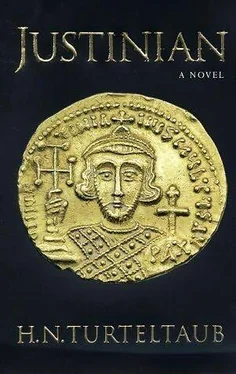Harry Turtledove - Justinian
Здесь есть возможность читать онлайн «Harry Turtledove - Justinian» весь текст электронной книги совершенно бесплатно (целиком полную версию без сокращений). В некоторых случаях можно слушать аудио, скачать через торрент в формате fb2 и присутствует краткое содержание. Жанр: Историческая проза, на английском языке. Описание произведения, (предисловие) а так же отзывы посетителей доступны на портале библиотеки ЛибКат.
- Название:Justinian
- Автор:
- Жанр:
- Год:неизвестен
- ISBN:нет данных
- Рейтинг книги:3 / 5. Голосов: 1
-
Избранное:Добавить в избранное
- Отзывы:
-
Ваша оценка:
- 60
- 1
- 2
- 3
- 4
- 5
Justinian: краткое содержание, описание и аннотация
Предлагаем к чтению аннотацию, описание, краткое содержание или предисловие (зависит от того, что написал сам автор книги «Justinian»). Если вы не нашли необходимую информацию о книге — напишите в комментариях, мы постараемся отыскать её.
Justinian — читать онлайн бесплатно полную книгу (весь текст) целиком
Ниже представлен текст книги, разбитый по страницам. Система сохранения места последней прочитанной страницы, позволяет с удобством читать онлайн бесплатно книгу «Justinian», без необходимости каждый раз заново искать на чём Вы остановились. Поставьте закладку, и сможете в любой момент перейти на страницу, на которой закончили чтение.
Интервал:
Закладка:
I weighed him in the balance and did not find him wanting. Continuing to speak against my point of view, I told myself, took a certain amount of courage, courage that could also be usefully employed against the Arabs. I said, "Send out orders for the armies from the military districts to gather at their assembly points. Send orders to Neboulos and the special army, also. I shall personally lead forth the imperial guards to join them."
He bowed. "Emperor, everything shall be as you say."
While I contemplated war against the followers of the false prophet, Abimelekh contemplated desecrating a famous and holy Christian shrine. I learned of this as the result of an unexpected embassy from the lands controlled by the miscalled commander of the faithful.
Both ambassadors, as often happens, were Christians: Sergios of Damascus, the son of the Mansour with whom my father had often dealt, who served Abimelekh as finance minister; and Patrikios Klausus, the leader of the Christians of Palestine. "Emperor, we are in sore need of your aid," Sergios said after he and Patrikios had prostrated themselves before me. "Abimelekh, my ruler, plans to restore the temple at Mecca, which suffered in the Arabs' late civil war."
"Why is this a concern to me?" I asked with genuine curiosity. Though the center from which the Arabs' false prophet sprang out like a wolf, Mecca had never been under the dominion of the Roman Empire.
Patrikios answered me: "Emperor, for the restoration he plans to take columns from the grotto of Christ's agony at holy Gethsemane."
"An outrage!" I shouted. Had I not already decided to go to war against the Arabs, learning of the wickedness Abimelekh planned on perpetrating would have impelled me in that direction.
But Mansour held up a soothing hand. "We asked him not to do this, Emperor, hoping you might supply us with other columns to use in their stead."
"That I can do," I said at once. "This I shall do." In my mind's eye, I saw the fortress of Ankyra in central Anatolia, and what had been the city and was now the field of ruins below. Abimelekh could have a hundred columns from those ruins alone without making anyone notice they were missing. And Ankyra was but one of the scores of cities that had shrunk or died in the incessant warfare of the past ninety years. The miscalled commander of the faithful was welcome to our rubbish, even if I was about to go to war with him.
Sergios and Patrikios were effusive in their thanks. "We knew your generosity would let us preserve the holy place undisturbed," Patrikios said.
"No matter what happens," I promised, "I will send these columns to Abimelekh for his false temple at Mecca, so that he need not trouble a shrine belonging to the true faith." This promise I kept, preventing the desecration of the church at Gethsemane.
Perhaps I should not have said no matter what happens: in so doing, I gave a sort of warning of what I intended in aid of my campaign in the east. Sergios, however, took it a different way, saying, "Emperor, on our journey hither, we saw your new nomismata, and very beautiful they are, too."
"They are indeed," I said, "and show, as they should, Christ protecting the Roman Empire and the Roman Emperor."
"There is only one difficulty with them," Sergios said, "and that is that I fear my master, the caliph Abimelekh, will not accept them in his realm, since they contradict the teachings of his religion. He will have to pay you the agreed-upon tribute in coins of his own minting."
"We agreed it should be paid in nomismata," I reminded him.
He looked worried. "The weight of gold would be the same, Emperor, so you would not suffer any loss as a result of this. Only the images and legends of the coins would change."
"That was not part of the agreement we made."
Sergios looked unhappier yet. "Is this the word I should convey to the caliph? He will not be pleased to hear it, not even when I have the joy of telling him you have made arrangements to spare Gethsemane."
His words showed me courtiers in Damascus played the same games as did those of Constantinople, using good news to offset the bad and to keep their sovereign in as sweet a temper as they could. It is probably the same among the blond barbarians of the west. It is surely the same among the Khazars, who roam the plains north of the Black Sea. I have seen that with my own eyes.
To Sergios, I said, "If this message so distresses you, you need not deliver it to Abimelekh." Hearing that, he brightened. But I had not finished: "I shall give it to him in person," I said.
Sergios's face fell. So did that of Patrikios Klausus. Myakes suffered a coughing fit. If I had it to do over again, I would have held my tongue. But I did not have it to do over again. Abimelekh would be warned.
MYAKES
A coughing fit? I hope I did, Brother Elpidios. I like to have swallowed my tongue, is what happened. Lord have mercy, Brother, the only quicker way Justinian could have given Abimelekh the news that he was going to war with him would have been to send his own messenger.
Why did he do it? No, not stupidity, I don't think. Justinian was a lot of things, but not stupid. What's the word I want? The one left over from the old pagan dramas the fifth-sixth synod condemned? It means overweening pride, something like that.
Hubris? Thank you, Brother. Aye, that's it. He'd beaten the Sklavenoi, Leontios had beaten the Arabs, he had Neboulos and the special army, he didn't think he could possibly lose. So why not let Abimelekh know he was coming? He figured Abimelekh would spend that time shivering in his shoes.
Sounds like Leontios tried to warn him about Abimelekh. I don't have a whole lot of good things to say about Leontios, but he did try. Justinian wouldn't listen to him. He wouldn't listen to people, Justinian wouldn't. He went ahead and did what he thought he ought to do. When that worked, it worked fine. When it didn't\a160… well, see what happened when it didn't.
JUSTINIAN
I ordered Neboulos's special army and the armies of the military districts to assemble at Sebastopolis, in the military district of the Armeniacs. Those soldiers having begun to move before I could, the excubitores and I traveled by sea to Amisos and then went down to Sebastopolis rather than making the whole long, slow journey by road.
As I left the ship that had brought me to Amisos, the officer in charge of the fleet said, "Good fortune go with you, Emperor, and God bless you and your army."
"Thank you, Apsimaros," I said. "May you have safe winds back to the imperial city." He nodded. His face was long and thin and pale. I believe he had German blood of some sort in him, which accounted not only for his looks but also for his peculiar name, one without meaning in either Greek or Latin.
The excubitores and I rode toward Sebastopolis the next day. I looked back and saw Apsimaros's fleet sailing west toward Constantinople. I sighed a little. If we could travel by land as readily and cheaply as by sea, governing the Roman Empire, feeding the cities, and collecting taxes would be far easier than they are. But even a paved highway like the Via Egnatia, while allowing soldiers to move rapidly from one part of the Empire to another, does not let good travel cheaply. Take grain in carts more than a couple of days' journey and its price doubles or worse. And so, very often, inland districts are more isolated than islands.
Too much time wasted on a wish that is and must for all time be idle. When, with the excubitores around me, I rode into the camp, I glowed with pride at the size of the army I had caused to be assembled. The tents of the cavalry forces from the military districts stretched over a wide expanse of dusty plain. Off to one side were other tents and huts, these run up in a less orderly fashion. I pointed them out to Myakes: "See how large Neboulos's special army is? As many men there as in the contingents from the military districts, I'd say."
Читать дальшеИнтервал:
Закладка:
Похожие книги на «Justinian»
Представляем Вашему вниманию похожие книги на «Justinian» списком для выбора. Мы отобрали схожую по названию и смыслу литературу в надежде предоставить читателям больше вариантов отыскать новые, интересные, ещё непрочитанные произведения.
Обсуждение, отзывы о книге «Justinian» и просто собственные мнения читателей. Оставьте ваши комментарии, напишите, что Вы думаете о произведении, его смысле или главных героях. Укажите что конкретно понравилось, а что нет, и почему Вы так считаете.












